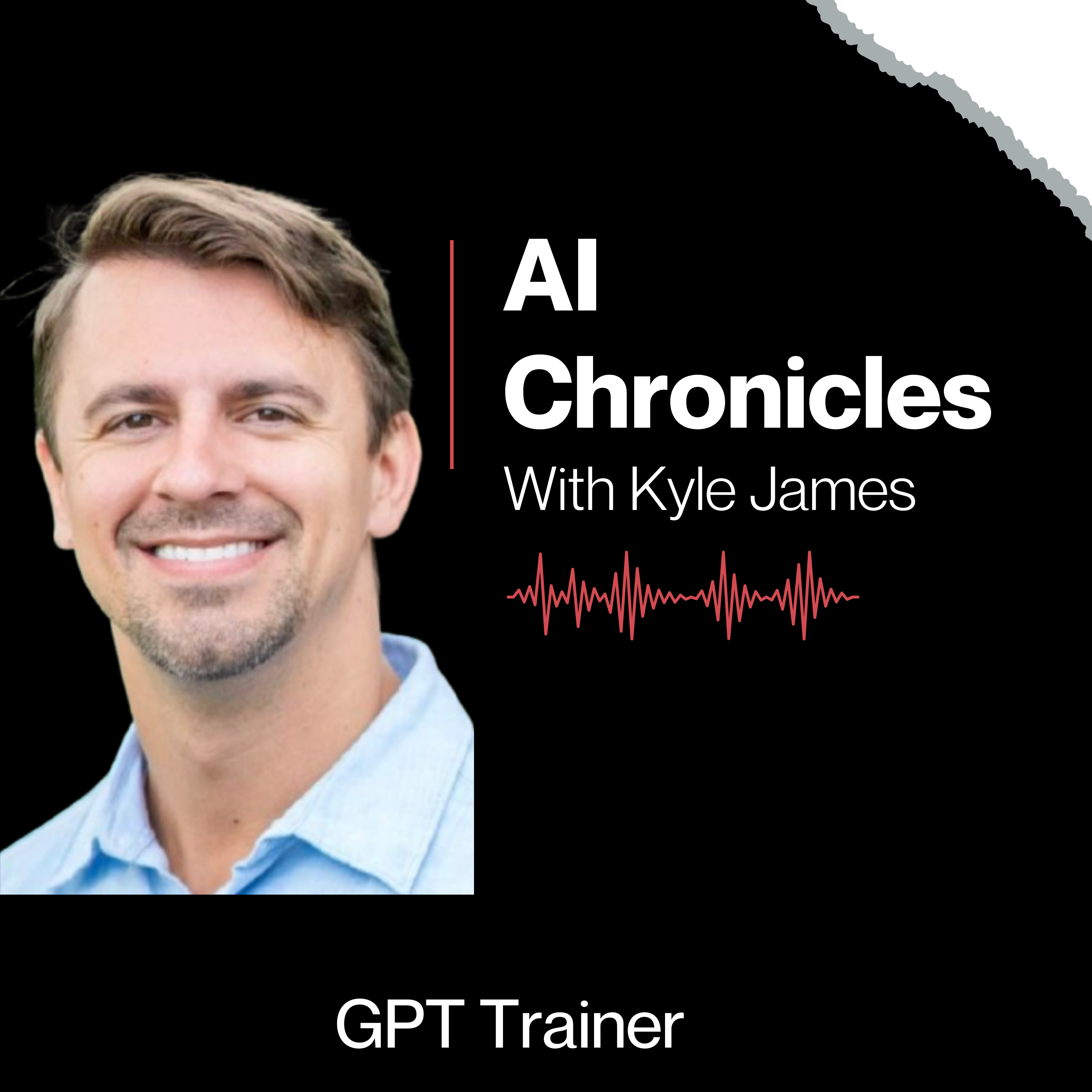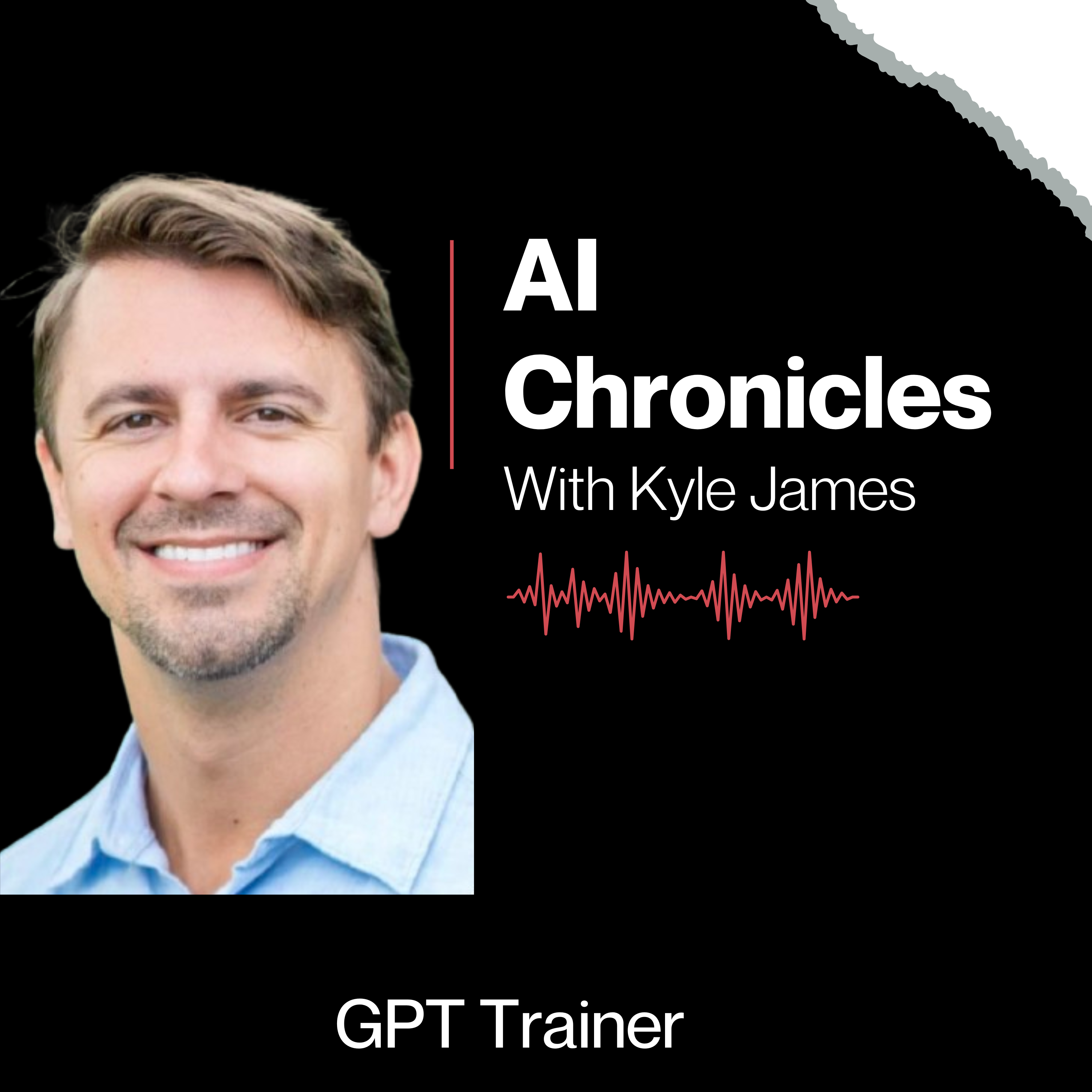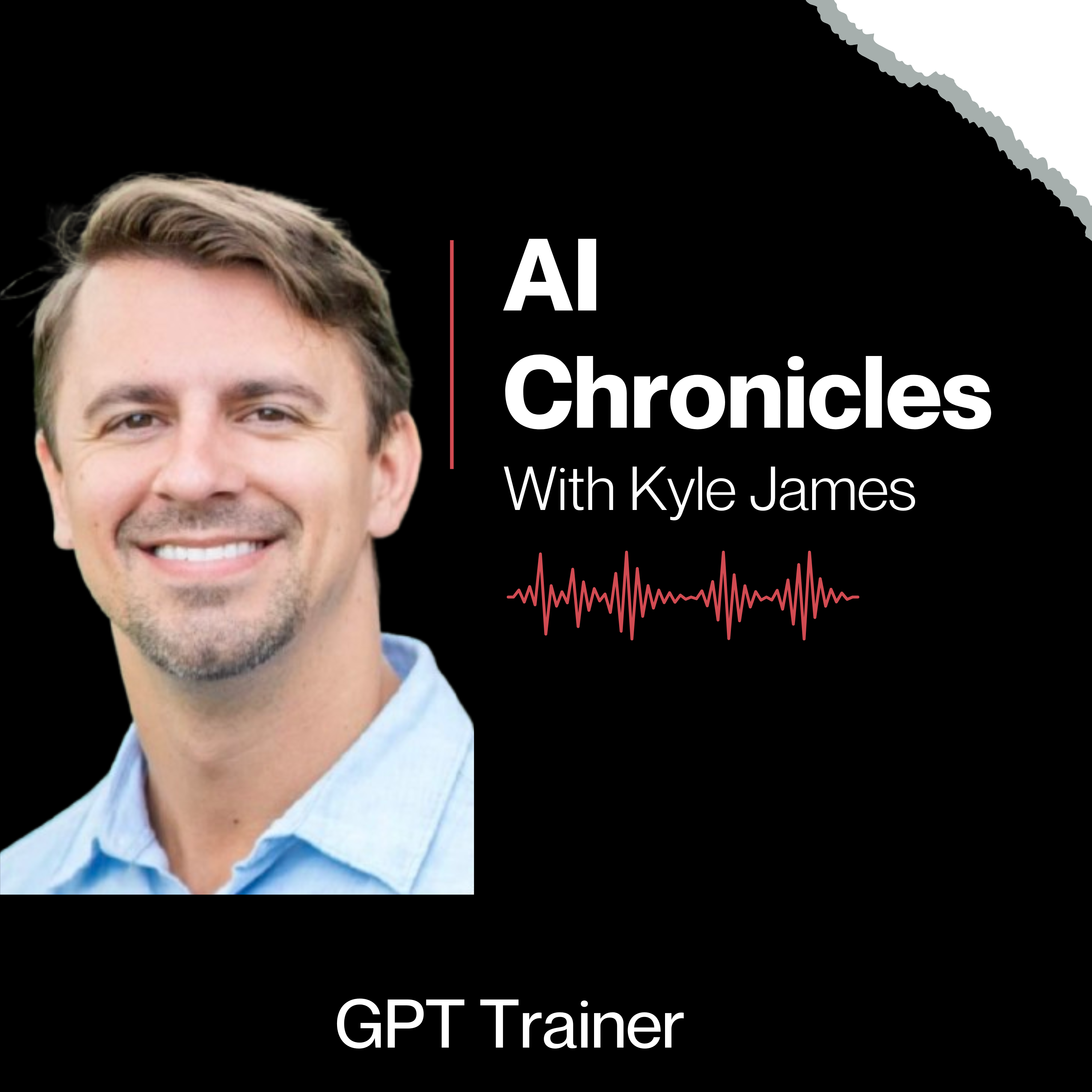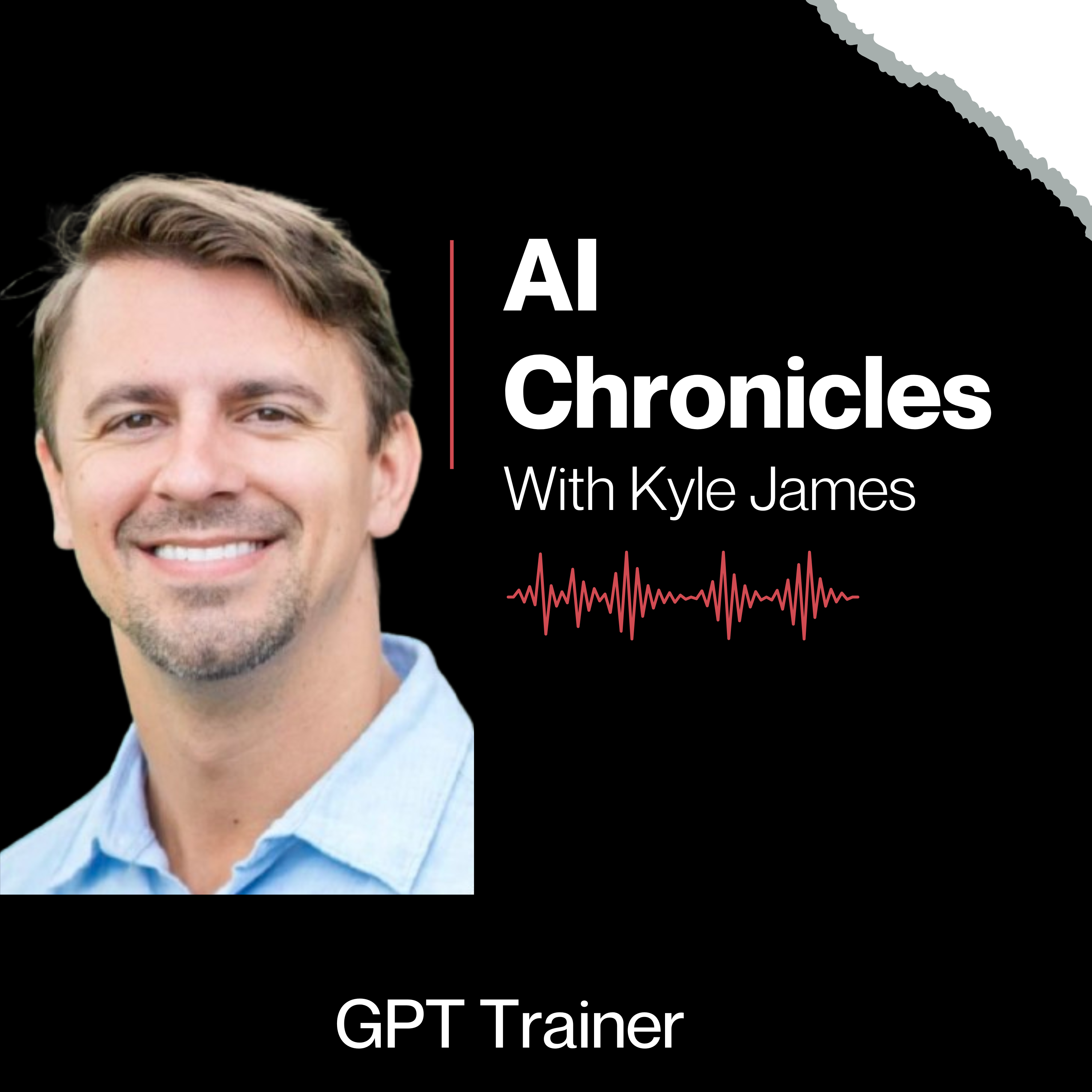Episode Transcript
Kyle James (00:00) Hey, welcome to the AI Chronicles podcast. I'm your host, Kyle James. Today we're to be diving headfirst into how a business consulting and services company called Harmony Consulting Group is using AI inside of their own business. Harmony Consulting Group is a global management consulting and executive coaching firm. They partner with female consultants and coaches to streamline with ease through operational excellence and sustainable growth with the overhead of a full-time chief operations officer. Before I dive into that though, you need to listen closely. Are you looking to implement AI inside of your own company or just struggling to get your AI to stop hallucinating? Speak to GPT trainer. GPT trainer literally builds it out and manages your AI agent for you. Eliminating hallucinations for good. Go to gpt-trainer.com. I promise you it'll be the biggest time saving decision you've made all year. Trying to set up your AI on your own is like trying to build a house from scratch. Sure, you could do it, but The time and frustration it's going to take to get it finished just isn't worth it. It's a thousand times faster and safer to hire professionals. Again, that's gpt-trainer.com. Today I have with me, Latonya Roberts, the founder and CEO of Harmony Consulting Group. Hey, Latonya, welcome to the show. How are you doing? La Tonya Roberts (01:13) I'm doing great, how nice to be here. Kyle James (01:18) Super glad to have you on. So just give us a little, maybe a little bit of background. Tell me about more of maybe Harmony Consulting Group and how it came to be. La Tonya Roberts (01:19) Sure, so I come from the world of consulting. ⁓ 19 years now, started out at Booz Allen Hamilton, worked for a couple of small consulting firms and then ended up at Deloitte doing IT adoption, change management strategy. A lot of your operations type stuff, your business process improvement and eventually got into leadership development. executive coaching training and in 2020 along with a lot of people I had a change of heart and said you know what I want to go out and do this on my own and started working with other people and just consulting together and I've been doing that ever since for the last few years and I decided I want to you know start working with the big consulting firms or the big companies and work with smaller businesses and bring you know what I've been doing for the last almost 20 years to them. Kyle James (02:10) Yeah. And what was that like? I mean, when you made that shift, cause it was a big change. Like were you, I mean, what kind of puts you over the edge and say, okay, you know what? I'm going to do this. I'm going to make this change. La Tonya Roberts (02:16) Yeah, you know what, honestly, my kids were getting older in high school. I wanted to spend the last few years with them and be more present. So I needed to kind of change up my working style and how busy I was. And I moved us in 30 days from the DC, Maryland, Virginia area down to Atlanta. And I was like, OK, kids are starting over. mean, you're not online in school or you're not going to Kyle James (02:30) Mmm. Wow, 30 days, huh? La Tonya Roberts (02:43) physically, so let's go. And it's been great ever since then. Yeah. Kyle James (02:47) Yeah. La Tonya Roberts (02:47) 30 days. Kyle James (02:48) Yeah. Wow. That's, that's a fast 30 days and it's a long ways down to, but I mean, I mean, I guess it turned out well for the most part since now that you've been having a lot of traction. La Tonya Roberts (02:55) It did. It was actually one of the best decisions I ever made to just change up the environment, move away from what I know and kind of stay in a bubble to build out the business. Kyle James (03:07) Yeah. So tell us maybe a little bit more, you know, cause I know you've, you've been using a little bit of AI within Harmony Consulting Group. I think it's fantastic what you're doing, but before we dive into that, just tell me like, what made you decide to start, I guess, like implementing AI in the first place and what challenges were you trying to navigate around that with your current clients? La Tonya Roberts (03:22) Sure, so actually, mean, AI, I've been hearing about it for years through my work with Deloitte. We were doing AI there, the machine learning. We didn't necessarily call it AI. We may have referred to it as something else. So I'd always been familiar with it. And then in my business, you you go from having a large machine, a big organization with a bunch of people and all these resources to just you and maybe your BA. You have to learn how to work as efficiently as possible. And so I started playing around with AI. Kyle James (03:39) Mm-hmm. La Tonya Roberts (03:52) and getting involved with other communities with AI to just really learn. I'm such a nerd. I love learning something new all the time. So I started playing around with it and realized I could do a lot of these things a lot faster, tinkering around with different prompts and what have you to just run the business, save myself some time, save myself some money. And then listening to clients and the challenges that they were having, I started putting together GPTs for them as well. Kyle James (04:18) Hmm. Okay. So then, so you had, I guess a little bit of experience from Deloitte. mean, machine learning, right. Or AI or just essentially like these massive machines or software that you could use at your disposal, taking that transition into like your own business. Now it's not just even you using it, but you've even had some of your clients that you've been, you know, using AI, guess, building it for them. Walk me through like kind of what that step-by-step process looks like on the AI side. La Tonya Roberts (04:40) Sure, so I had one client that wanted to do a competitor analysis. And now there's a bunch of stuff out there that you can do a competitor analysis. But at the time, I built it from scratch. And it was really just. taking information about the business, understanding what data she wanted, and then putting in the prompt, playing around with the prompt to figure out, know, what is the role? What is it that you want to have? What are some of those knowledge sources that can be referred back to figure out, who are the true competitors? What is their unique service proposition? How much are they are? what types of products or services do they have out there? What are some of the gaps? And was able to put out a report and say, here's what they do, here's what you do, here's a need that you can fill, here's what your ideal audience may be looking for, and then here's how we can go to market. Right? So something that would have taken before weeks or several hours to do, now you have this in a couple minutes. Right? So it was little things like that where you're like, well, yeah, we do competitor analysis or we build out prompts or blogs or whatever. How can we do this efficiently? Kyle James (05:52) Yeah. So I take figuring out like what, you know, especially like if there's, you know, individuals that you're coaching, like they can't do it all on their own. it's like identifying almost like certain aspects of their, of their workflow and go, okay, Hey, look, we can potentially automate this ICP, you know, build out, or even like the lead generation build out, or maybe even like, you know, whatever the avenue is. And since you've been adding that in and, and, and working with your clients in that regard, like what sort of like, results have you been seeing so far when you've, when you've made that change? and I would say this both for the AI side, but even sort of maybe on the, on the coaching and consulting side too. La Tonya Roberts (06:27) Yeah, mean, some of the changes are won, you get a chance to free up some creative and strategic thinking time. Right? Because now you're not spending so much time on those administrative things that the menial, not to say menial, but those repetitive tasks that you just, you have to do as part of the business. If you can automate that process, now you have more time to focus on the strategy, focus on the vision, build out new services, work with your team, connect with other people. So why don't you get your time back? Kyle James (06:40) Mmm, that's really good. La Tonya Roberts (06:59) That's going to be the biggest thing. The second part is you're saving money too. So where you may have had a person coming in part-time or even full-time doing certain tasks, now you're able to have an AI employee versus a human resource. And it's not to say you're not bringing in more people, but it's saying, hey, now I have a budget to bring on some of those roles that do cost a little bit more money that I wasn't able to afford before. Right? And so there's always going to be what I say that the future of the workforce, you're going to have your AI employees and you're going to have your people employees. Right. And they're going to they're going to collaborate and complement each other in order to really run the business for you. So, you know, what is it that you want? What can you automate and what do you truly need people for? Kyle James (07:30) Mm. Yeah. I love the way you phrase that too, like for creative thinking, time saving, even money saving. Like creative thing is such a, mean, even with some of the C-suite executives that you're probably coaching, like that is like their bread and butter. Like they have to have that creative thinking. I heard it once from, I don't recall who the CEO of LinkedIn is, but it was a CEO of LinkedIn. And as busy as this person is, you would think that like every single minute and like Steve jobs, every minute is carved to the T of what they're doing. But that CEO of LinkedIn actually spends roughly two hours per day, just sitting down and carving out ideas and thinking through like, that, if the CEO of LinkedIn is doing it, then obviously it's probably pretty important. And so when you mentioned like just, Hey, freeing up the creative time, like that's like, that makes all the difference to going from average to superior when you can have that extra time, that a little bit of edge that you mentioned and What would you say, even on the, I want to talk a little bit, of course on the AI, but tell me a little bit more about your consulting services. Like what exactly are you offering to those who are maybe they're a startup company or they are pretty good size 150, 50 employees or even higher. Like what services do you exactly do you offer to them? La Tonya Roberts (08:55) Sure, so the main thing that I offer is fractional chief operations officer support. So what that does, it's two things. One, I am the partner to that CEO so that they can spend more time on the creativity and the strategic planning and really focus on building out the business. And they don't have to worry about taking that vision and figuring out how to operationalize it. I will do that. So I'm going to work with them. We're going to do the strategic planning together. And then I'm going to say, OK, here's how you do it. They're the what, I'm the how. is simplest way to put it. So I am looking at the processes. I'm looking at the technology. I'm looking at the people, the different resources, the systems that we need to put in place. How are we measuring success? How are we preparing for changes in the environment? How are we getting out there and putting out partner with the marketing team to get the communications out there and make sure that people understand who we are, what we do, and things like that. And then we're constantly going back and looking at the strategy and the vision and making sure that we're on track. And what this is also going to do is because there's so much more time now to focus on the data and what's going on, if there's a major change in the market like a lot of us are experiencing now, we can pivot quicker, right? We can get ahead of it a lot faster. Kyle James (10:17) Hmm. Because there's a clear vision, like because, because it was aligned that because of the alignment that you helped them carve out of like, Hey, here's what's important. Here's where we spend time that when it does happen, there is a shift in the market. The storm blows through. There's a little more foundational support because you're like, we already know. We know all the aspects of the, of the business and we can just shift here and there. And then that makes it essentially easier to, to adapt to it. Yeah, that's amazing. And, La Tonya Roberts (10:36) Right. Kyle James (10:44) I will ask question here as far as like on the AI side is, you know, with AI making so many changes in the market and there's just all, I you've seen it. There's like new software, a new large language model, chat, GBT did this, know, Claude and Thropic did that. what would you say for Harmony Consulting Group? What, types of AI maybe initiatives do you have in, you know, in place for the future and where do you see that playing a huge role in your operations next when working with these C-suite executives and different mentees, I guess you would say. La Tonya Roberts (11:13) So like you said, there's a lot of models that are out there, right? And while I may tinker around with a lot of them, most of my clients, know Chai GPT, they know Claude, they know Perplexity, they know Gemini, and a few others. So what I will do with them is I will focus more so on those more well-known models that are out there and then help them build out their systems around that. and even creating like a agent type situation where we are linking a bunch of GPTs together in order to complete something. A lot of times people will make the mistake of doing one GPT and asking it to solve five different problems. And it's like, no, GPT is made for one thing. So create that GPT to do one thing, but then you can connect it to the next step. Kyle James (11:39) Mm-hmm. Sure. La Tonya Roberts (12:04) So in order to do that, we need to get clear on what is the problem that you're trying to solve and then what are the steps to solve it. Then we can go back and create the automation around that. Kyle James (12:15) Yeah, that's great. It's almost like the, like, see, I'm thinking like the sequencing agentic flow or it's like what you said, like you build out one that's it's got it's certain expertise and then you bought another one and then another one. And then at the very end of it, then you connect almost like a train with like cargo, you know, get this. And then once you have it, everything together and loaded, then you connect it. And then now you can start sending, know, so it's kind of visually, I saw that when you explained that. So, and I appreciate you sharing that perspective. And as far as for people who are listening in, maybe they're interested in to learn more, where can they go? La Tonya Roberts (12:32) Mm-hmm. Kyle James (12:44) to guess, you know, either go on your website or reach out to you directly. What do you propose they reach out to you in that regard and learn more about Harmony Consulting? La Tonya Roberts (12:46) You can go to my website. It is HarmonyConsultingGroup.org. So o-r-g harmony consulting group.org and then I also have a free Facebook group It is called harmony ops collective and that's where I'm giving out additional tips and tools on the operations side of the business So that people can really understand, you know How can I make this a part of my business and make me touch on the well-being side too, right? Because I don't want a burnt out operator or see I just reminded them. It's okay to take a day off Kyle James (13:16) Mm. Right. Yeah. La Tonya Roberts (13:18) Right. Kyle James (13:21) Yeah, yeah, you can, you don't have to work 12 hours a day. It's okay to take, you know, take some vacation with the family. It's totally fine. So awesome. Amazing. Well, thank you so much, Latonya. I appreciate you have making the time to hop on this podcast today. And, you know, hopefully we can maybe have one in the future again. La Tonya Roberts (13:32) Absolutely, thank you for having me. Kyle James (13:37) Yeah, absolutely. And remember, if you're listening in and you're looking at implementing AI into your business today, don't try and do it yourself. The time and stress and inaccuracies that you can potentially get with AI just aren't worth it. Schedule a call with GPT trainer or let them build out and manage your AI agent for you. Again, that's gpt-trainer.com. Signing off for now. Thanks for listening in. Have a wonderful rest of your day. Tanya, it was a pleasure. I'm looking forward to seeing you again. and we'll see you on the next episode of AI Chronicles.



